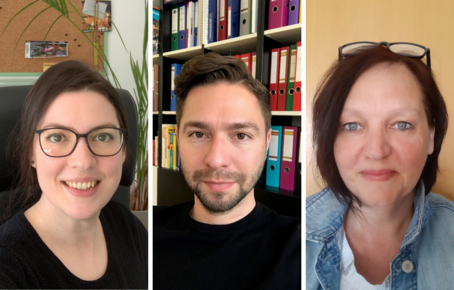Team of the month 04/2020: Audit Hochschule und Familie
Ensuring the right balance between family/private life on the one hand and professional responsibilities or academic studies on the other is an important priority for universities, but it can also be a major challenge. As part of the hochschuleundfamilie audit, Georg Hanke, Inge Pernold, and Birgit Sattler have been working continuously to improve the conditions for a healthy work-life balance at WU. In January 2020, WU received hochschuleundfamilie certification for the third time, confirming the success of this work.

For WU as an employer and a university, the hochschuleundfamilie audit provides an ideal framework for further improving work-life balance measures on a continuous basis. Based on the clear structures and processes of the audit, WU takes stock of the measures it is taking to improve the balance between family life, job duties, and academic studies, and defines specific target agreements in this area. This approach guarantees that the steps WU is taking are custom-tailored to the needs of WU’s employees and students.
The goals and measures are developed step by step in cooperation with representatives of all members of the WU community. The result is a target agreement approved by the university management.
The audit is intended as a continuous improvement process, based on 3-year cycles, to establish and further develop a family-friendly culture at WU. The project team is working with the various WU teams and units involved to implement the targets for the individual audit periods.
WU has been working on topics related to work-life balance as part of the audit since 2012. In 2013, WU was awarded the basic hochschuleundfamilie certification. For an organization as large as WU, the audit is an ideal tool because it encourages continuous work to improve many different aspects of work-life balance, which is more beneficial than focusing on individual short-term projects when it comes to a topic as broad as this one. The certification does not merely focus on a snapshot of what has been achieved. Instead, it is based on the fulfillment of a target agreement during a 3-year period.
Many WU employees are probably familiar with some of the more prominent measures that have been implemented as part of the audit, even though they may not be aware that these steps are actually results of the audit process. Examples include for instance a more high-profile role given to WU’s medical officer, allowing him to run a doctor’s office on campus and issue prescriptions. Another example are the childcare services for pre-school children WU has been offering during university breaks for some years now, with great success.
“One crucial aspect I’d like to emphasize is that improving work-life balance doesn’t have to be a trade-off or a sacrifice,” says project head Georg Hanke, who has been leading the project since it started in 2012. “Often small changes can go a long way and have a strong impact in the long run. To me, one of the main aspects of the audit is communication. It’s not necessary to perform miracles to improve work-life balance.”
We are proud of what has been achieved at WU since the start of the audit and we are looking forward to continuing our work on improving the compatibility of family/private life, professional responsibilities, and academic studies in the years that lie ahead.
Team of the month
Research and teaching are the key areas of a university’s work, and the most visible. However, the work of the administrative staff is also very important for making sure that a university can operate smoothly and successfully. The members of our administrative staff may not be as highly visible as our researchers, but it’s their commitment that provides our researchers and teaching staff with crucial services like a powerful IT infrastructure, state-of-the-art library services, effective support services for faculty and researchers, tailor-made in-house training programs, or personal support in running the day-to-day operations of an institute – all of this requires careful planning and organization. To bring some of these people into the spotlight, we are naming a Team of the Month 6 times a year to introduce selected members of the administrative personnel and reward them for their important achievements in specific projects.
